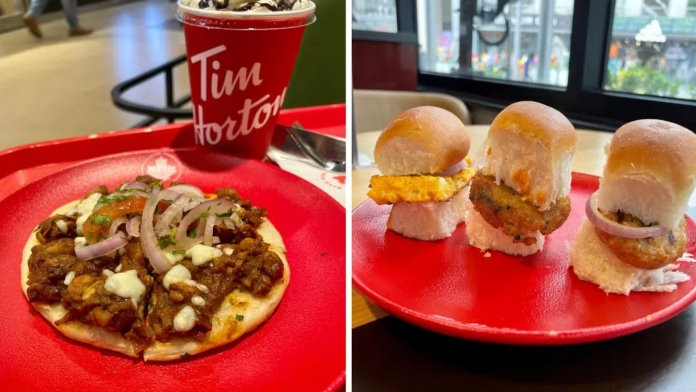Last August, Tim Hortons, the esteemed Canadian coffee brand, entered the Indian market with its expansion strategy. To distinguish itself from competitors, the company also introduced a unique approach by incorporating customized regional food items into its menu.
Following its successful venture in the northern region, Tim Hortons has extended its operations to West India. As part of its expansion, the brand now offers delectable options like Makhni Pasta, while also preparing to introduce delightful additions such as Pinwheel Samosa and Baida Roti Cigar-rolls. This move showcases Tim Hortons’ commitment to catering to regional preferences and diversifying its menu offerings.
Tarun Jain, Chief Executive Officer of Tim Hortons India, said, “India is a very different market in terms of the choices and taste preferences, so when we launched in India, there’s a lot of work which went into the backend, to kind of put forward a menu which has got decent amount of variety and lot of local adaptations.”
“When we launched in the north, we had makhni pasta for example, which was more suited to the localities there. Now, when we are coming to Mumbai, we have added a couple of products like a Samosa and a Baida roll which is more in sync with the local taste preferences in Mumbai.”
Starbucks India, another coffee chain , recently increased Indian options on its menu. It added masala chai, elaichi chai and milkshakes and pre-packed sandwiches and other food items.
In India, Tim Hortons offers Timbits, also known as ‘donut holes,’ as their most budget-friendly food item, priced at INR 39.
Jain is of the opinion that Tim Hortons has made a timely entry into the Indian market. He said, “I think this is a great time to enter India.”
According to Jain, Tim Hortons is actively contemplating expansion into tier 1 markets. As of now, the chain has successfully opened 13 stores in North India.
“I think this is a great time to enter India, because the market is going through a lot of evolution and a lot of change. The cafe market is really imploding with the opportunity. So, I think it’s a great time to be into the market,” he said.
“The demand is growing at a great pace. I think cafes have outperformed the F&B industry in India and I think coffee houses are probably the largest share of that growth.”
As per the analysis conducted by IMARC Group, the pub, bar, café, and lounge (PBCL) market in India is projected to exhibit a compound annual growth rate (CAGR) of 13.3 percent from 2023 to 2028.
Additionally, the report highlights that the PBCL market in India is experiencing robust growth due to the growing demand for socializing and gathering in eateries that provide distinctive ambiance, entertainment, and a diverse range of food and beverages.
“The primary factor driving the India pub, bar, café and lounge market is the growing disposable incomes across the country… Moreover, brands are increasingly focusing on factors such as varied food offerings, ambience, and customer engagement to ensure the longevity and strength of their businesses and create a niche for this segment,” the report said.





